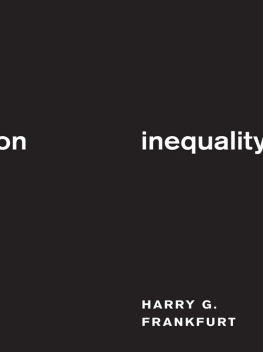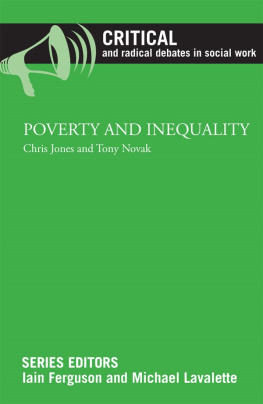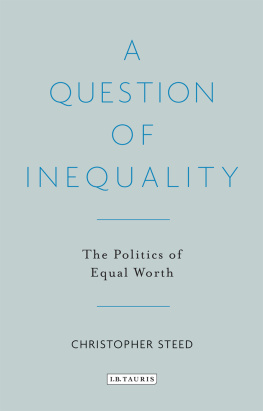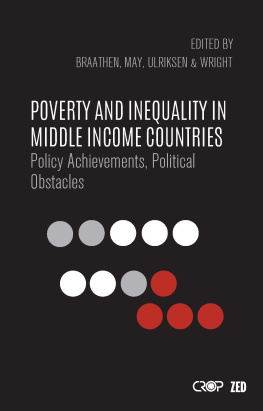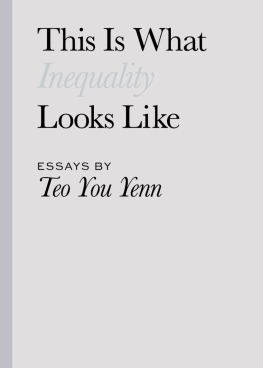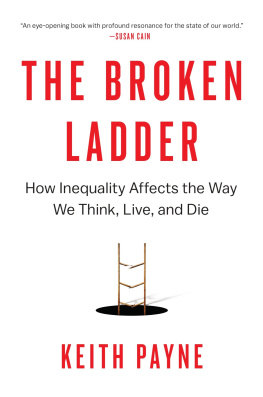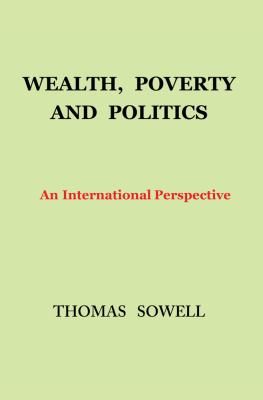on inequality
on inequality
HARRY G. FRANKFURT
Princeton University Press
Princeton and Oxford
Copyright 2015 by Princeton University Press
Published by Princeton University Press
41 William Street, Princeton, New Jersey 08540
In the United Kingdom: Princeton University Press
6 Oxford Street, Woodstock, Oxfordshire OX20 1TW
press.princeton.edu
All Rights Reserved
Library of Congress Cataloging-in-Publication Data
Frankfurt, Harry G., 1929
On inequality / Harry G. Frankfurt.
pages cm
Includes bibliographical references.
ISBN 978-0-691-16714-5 (hardcover : alk. paper)
1. Income distribution. 2. Distributive justice. 3. EqualityPhilosophy. I. Title.
HB523.F73 2015
340'.115dc23
2015009807
British Library Cataloging-in-Publication Data is available
This book has been composed in Sabon Next LT Pro and Berthold Akzidenz-Grotesk
Printed on acid-free paper.
Printed in the United States of America
10 9 8 7 6 5 4 3 2 1
For Joan, who disagrees (I think)
contents
preface
There has recently been quite a bit of discussionstimulated in part by the publication of the French economist Thomas Pikettys researchconcerning the growth in our society of economic inequality. The size of the gap between the economic resources of those who have more money and those who have less has been increasing rapidly. This development is regarded by many people as deplorable.
It is certainly true that those with greater wealth enjoy significant, and often objectionable, competitive advantages over those with less wealth. This is most conspicuous, of course, with regard to consumption. It is also conspicuous, far more importantly, with regard to social and political influence. The richer are in a position to throw around quite a bit more weight than are the poorer, in affecting the character of our social mores and conduct, and in determining the quality and the trajectory of our political life.
Insofar as economic inequality is undesirable, however, this is not because it is as such morally objectionable. As such, it is not morally objectionable. To the extent that it truly is undesirable, it is on account of its almost irresistible tendency to generate unacceptable inequalities of other kinds. These unacceptable inequalities, which may sometimes go almost so far as to undermine the integrity of our commitment to democracy, must naturally be controlled or avoided in the light of appropriate legislative, regulatory, judicial, and executive monitoring.
It is, I believe, of some considerable importance to get clear about these matters. Appreciating the inherent moral innocence of economic inequality leads to an understanding that it is misguided to endorse economic egalitarianism as an authentic moral ideal. Further, it facilitates recognition of why it may actually be harmful to regard economic equality as being, in itself, a morally important goal.
The first part of this book is devoted to a critique of economic egalitarianism. Its conclusion is that, from a moral point of view, economic equality does not really matter very much, and our moral and political concepts may be better focused on ensuring that people have enough. In the second part of the book I will recover one way in which economic equality may indeed be of some moral significance.
one
economic equality as a moral ideal
First man: How are your children?
Second man: Compared to what?
I
1. In a recent State of the Union address, President Barack Obama declared that income inequality is the defining challenge of our time. It seems to me, however, that our most fundamental challenge is not the fact that the incomes of Americans are widely unequal. It is, rather, the fact that too many of our people are poor.
Inequality of incomes might be decisively eliminated, after all, just by arranging that all incomes be equally below the poverty line. Needless to say, that way of achieving equality of incomesby making everyone equally poorhas very little to be said for it. Accordingly, to eliminate income inequality cannot be, as such, our most fundamental goal.
2. In addition to the incidence of poverty, another part of our current economic disorder is that while many of our people have too little, quite a number of others have too much. The very rich have, indisputably, a great deal more than they need in order to live active, productive, and comfortable lives. In extracting from the economic wealth of the nation much more than they require in order to live well, those who are excessively affluent are guilty of a kind of economic gluttony. This resembles the gluttony of those who gobble down considerably more food than they need for either their nutritional well-being or a satisfying level of gastronomic enjoyment.
Apart from harmful psychological and moral effects upon the lives of the gluttons themselves, economic gluttony presents a ridiculous and disgusting spectacle. Taken together with the adjacent spectacle of a sizable class of people who endure significant economic
3. To focus on inequality, which is not in itself objectionable, is to misconstrue the challenge we actually face. Our basic focus should be on reducing both poverty and excessive affluence. That may very well entail, of course, a reduction of inequality. But the reduction of inequality cannot itself be our most essential ambition. Economic equality is not a morally compelling ideal. The primary goal of our efforts must be to repair a society in which many have far too little, while others have the comfort and influence that go with having more than enough.
Those who are much better off have a serious advantage over those who are less affluentan advantage that they may tend to exploit in pursuing inappropriate influence over electoral and regulatory processes. The potentially antidemocratic effects of this advantage must be dealt with, accordingly, by legislation and regulation designed to protect these processes from distortion and abuse.
4. Economic egalitarianism is, as I shall understand it, the doctrine that it is desirable for everyone to have the same amounts of income and of wealth (for short, money).
In my opinion, this is a mistake. Economic equality is not, as such, of any particular moral importance; and by the same token, economic inequality is not in itself morally objectionable. From the point of view of morality, it is not important that everyone should have the same. What is morally important is that each should have enough. If everyone had enough money, it would be of no special or deliberate concern whether some people had more money than others.
I shall call this alternative to egalitarianism the doctrine of sufficiencythat is, the doctrine that what is morally important with regard to money is that everyone should have enough.
5. The fact that economic equality is not in its own right a morally compelling social ideal is in no way, of course, a reason for regarding it as being, in all contexts, an unimportant or an inappropriate goal. Indeed, economic equality may have very significant political or social value. There may be quite good reasons to deal according to an egalitarian standard with problems having to do with the distribution of money. Hence it may at times make sense to be more immediately concerned with attempting to increase the extent of economic equality than with trying to regulate the extent to which everyone has enough money.
Even if economic equality itself and as such is not important, commitment to an egalitarian economic policy might be indispensable for promoting the attainment of various desirable social and political ends. Also, the most feasible approach to reaching universal economic sufficiency might actually turn out to be, in fact, a pursuit of equality. That economic equality is not a good in itself leaves open the possibility, obviously, that it may be instrumentally valuable as a necessary condition for the attainment of goods that do genuinely possess intrinsic value.
Next page
